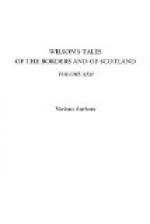Here he turned to me with a look of seriousness, and said, “Beware, young man, how you trust to your own strength and your own talents; for however noble it may be to do so, let it be in the open field, before you are driven into a corner, where your arms may come in contact with the thorns and the angles of the hedges.
“About this time, too, I fell in love—yes, fell in love; for I just beheld the fair object, and I was a dead man, or a new man, or anything you will. Frequently as I have looked and acted like a fool, I believe I never did so so strikingly as at that moment. She was a beautiful girl—a very angel of light—about five feet three inches high, and my own age. Heaven knows how I ever had courage to declare my passion; for I put it off day after day, and week after week, always preparing a new speech against the next time of meeting her, until three or four rivals stepped forward before me. At length I did speak, and never was love more clumsily declared. I told her in three words; then looked to the ground, and again in her face most pitifully. She received my addresses just as saucily as a pretty girl could do. But it were useless to go over our courtship; it was the only happy period of my existence, and every succeeding day has been misery. Matters were eventually brought to a bearing, and the fatal day of final felicity appointed. I was yet young, and my love possessed all the madness of a first passion. She not only occupied my heart, but my whole thoughts; I could think of nothing else, speak of nothing else, and, what was worse, do nothing else: it burned up the very capabilities of action, and rendered my native indolence yet more indolent. However, the day came (and a bitter stormy day it was), the ceremony was concluded, and the honeymoon seemed to pass away in a fortnight.
“About twelve months after our marriage, Heaven (as authors say) blest our loves with a son and, I had almost said, heir. Deplorable patrimony!—heir of his mother’s features—the sacrifice of his father’s weakness.” Kean could not have touched this last burst. The father, the miserable man, parental affection, agony, remorse, repentance, were expressed in a moment.
A tear was hurrying down his withered cheek as he dashed it away with his dripping sleeve. “I am a weak old fool,” said he, endeavouring to smile; for there was a volatile gaiety in his disposition, which his sorrows had subdued, but not extinguished. “Yet, my boy! my poor dear Willie!—I shall never—no, I shall never see him again!” Here he again wept; and had nature not denied me that luxury, I should have wept too, for the sake of company. After a pause, he again proceeded:—




